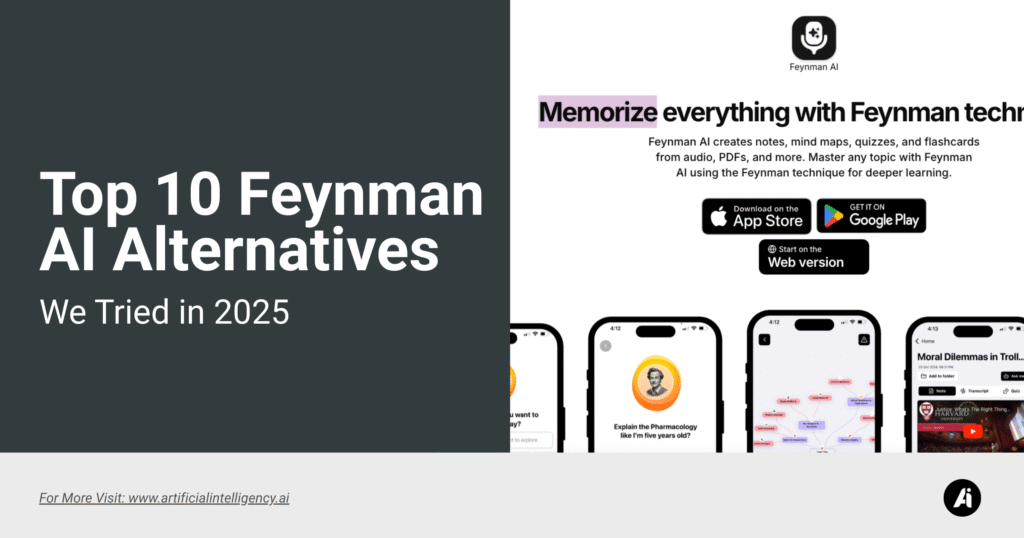Feynman AI by Notewave.app has made waves with its ability to simplify lectures, PDFs, and videos into notes, flashcards, and mind maps.
But as powerful as it is, it’s not the only option out there. Plenty of tools are offering similar or complementary features—some focus more on note-taking, others on summarization, and a few on active recall.
If you’re looking for Feynman AI alternatives, you probably want something that helps you digest complex ideas, stay organized, and actually retain what you study.
In this guide, I’ll walk you through ten solid alternatives worth exploring. Each one has its own strengths, pricing, and ideal use cases.
Why Look Beyond Feynman AI?
A balanced Feynman AI review shows that while the tool is an impressive study companion, it doesn’t cover every learning style or academic need.
Some learners prefer a more structured note system, while others rely on heavy-duty flashcards, long-term knowledge retention strategies, or research-specific tools.
That’s where exploring other platforms becomes valuable. Each alternative offers a unique strength—whether it’s simplifying complex material, helping you memorize information more effectively, or organizing research for long-term projects.
By considering these tools, you’re not abandoning the benefits highlighted in any Feynman AI review, but rather expanding your learning toolkit.
Some platforms are perfect for quick recall, others for deeper research, and some for building a connected web of knowledge that grows over time.
This is why a closer look at alternatives matters. After walking through them, you’ll also find a structured comparison that highlights their key features, strengths, and limitations side by side, making it easier to decide which one best fits your goals.
Exploring the Best Feynman AI Alternatives
While Feynman AI offers a strong way to break down concepts into manageable chunks, it isn’t a one-size-fits-all solution.
Some learners need more robust memory tools, while others want better organization, academic research support, or real-time lecture capture. That’s why it’s worth looking at other platforms that cover different aspects of the learning process.
The following alternatives represent a broad spectrum of study and productivity tools, each bringing something unique — from AI-powered summaries to advanced flashcards and knowledge graphs.
Together, they show how flexible modern learning platforms have become, and how you can tailor your toolkit to match the way you study best.
To make things even clearer, a comparison has also been outlined that highlights their core features, strengths, and limitations side by side.
This gives you a practical way to see how each tool stacks up against the others before deciding which fits your needs.
| Tool | Key Features | Pros | Cons |
| Notion AI | AI-powered summaries, outlines, integrated with Notion workspace | Highly flexible, great for organization, all-in-one productivity tool | Doesn’t auto-generate quizzes/flashcards, less study-focused |
| Mem.ai | AI “second brain,” automatic linking, retrieval-based notes | Great for long-term knowledge retention, effortless organization | No quizzes/flashcards, better for professionals than students |
| Quizlet | Flashcards, adaptive learning, spaced repetition | Massive library of decks, excellent for exam prep | Limited summarization, surface-level for deeper understanding |
| Perplexity AI | AI search engine, citation-focused, instant explanations | Reliable with sources, strong for research clarity | No study tools (flashcards/mind maps), requires internet |
| RemNote | Notes + flashcards + spaced repetition, hierarchical linking | Ideal for long-term mastery, strong memory retention | Steeper learning curve, requires manual setup |
| Obsidian | Markdown-based notes, backlinks, graph view, AI plugins available | Highly customizable, perfect for building a knowledge graph | Requires plugins for AI, setup can feel overwhelming |
| Anki | Spaced repetition flashcards, open-source plugins | Best for memory retention, huge community support | Outdated interface, not beginner-friendly |
| Evernote | Note-taking, organization, AI summaries, cross-device sync | Reliable for managing lots of notes, professional focus | Not tailored for studying, lacks flashcard/mind map features |
| Scholarcy | Summarizes research papers, highlights key arguments and references | Great for academic reading, time-saving for literature reviews | Doesn’t test recall, limited beyond research use |
| Glean | Records lectures, annotates in real-time, AI-powered organization | Excellent for live lecture capture, clean structured notes | Focused mainly on audio input, less versatile than others |
1. Notion AI
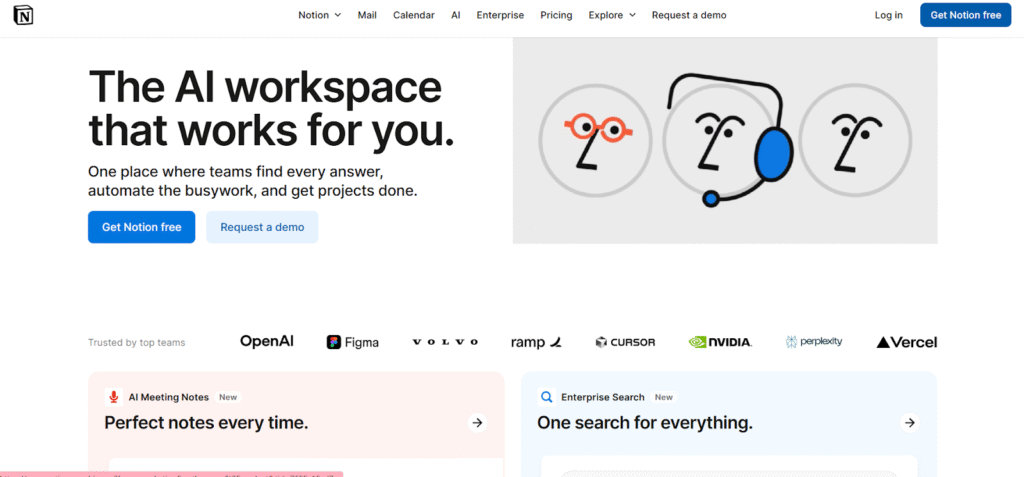
Notion AI has become one of the most popular productivity tools in recent years, and its AI integration makes it a real competitor to Feynman AI.
While Notion was originally known for customizable workspaces and databases, its AI assistant now helps summarize notes, create outlines, and even brainstorm ideas.
For learners, this means you can take your own notes and then let Notion AI simplify them, create study guides, or generate to-do lists for exam prep. Unlike Feynman AI, it doesn’t automatically make flashcards or quizzes, but it shines in flexibility—you can customize your workspace into a personal learning hub.
If you want a tool that combines knowledge organization with AI-powered summarization, Notion AI is a strong option.
2. Mem.ai
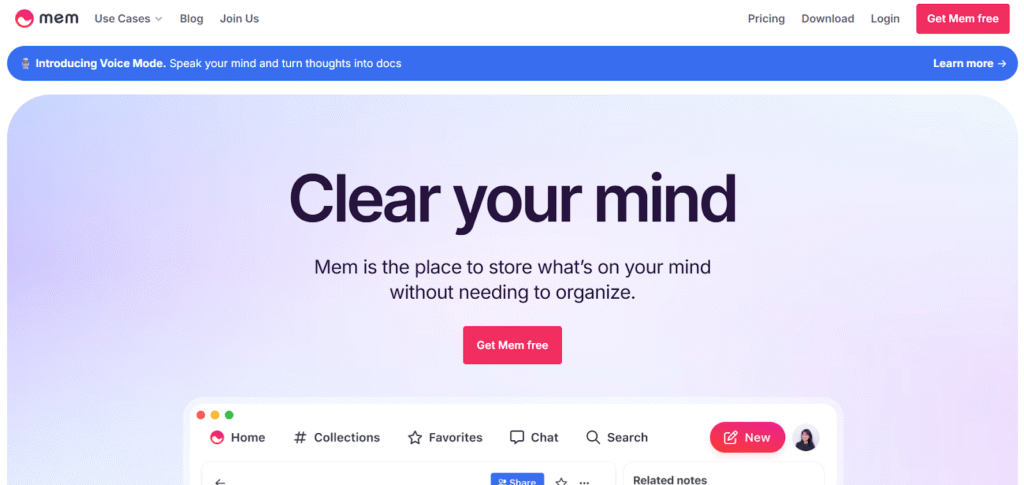
Mem.ai takes a different approach. Instead of static note-taking, it uses AI to create a “second brain” for you. Notes are automatically linked and retrieved when relevant, meaning you don’t waste time organizing.
Compared to Feynman AI, Mem doesn’t have the same quiz or flashcard focus, but it’s excellent for building long-term knowledge retention.
The app works best for professionals and researchers who need their notes to be searchable and interconnected.
If your main pain point is keeping track of ideas over time instead of just simplifying content, Mem.ai is a great alternative.
3. Quizlet
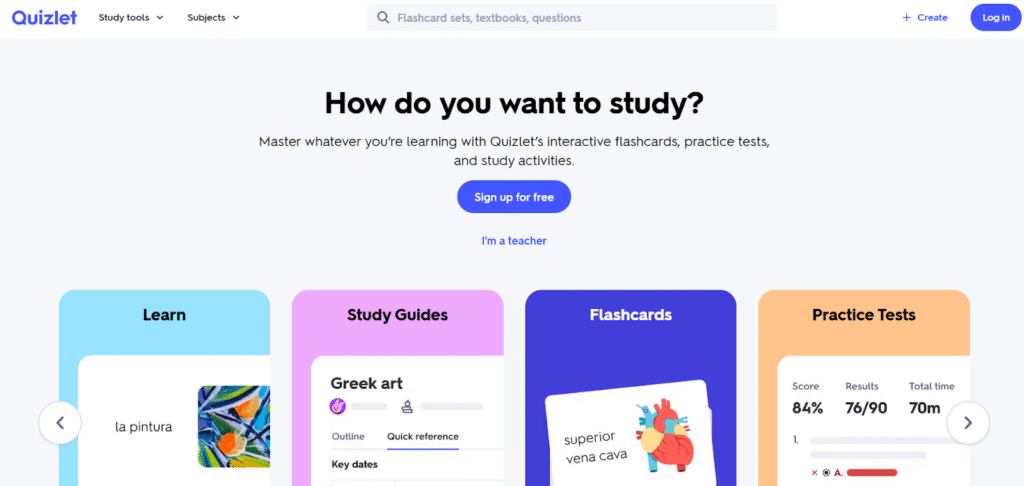
Quizlet is one of the oldest and most trusted names in study tech. Its AI-driven flashcard system is built for active recall, which aligns well with the Feynman Technique.
Students can create custom sets or use millions of pre-made decks across subjects.
While Quizlet doesn’t generate summaries or notes automatically, its strength lies in testing and memory. Features like spaced repetition and adaptive quizzes make it ideal for exam prep.
For someone who prefers active practice over reading summaries, Quizlet is often more effective than Feynman AI.
If your main goal is memory retention, Quizlet remains a top choice.
4. Perplexity AI
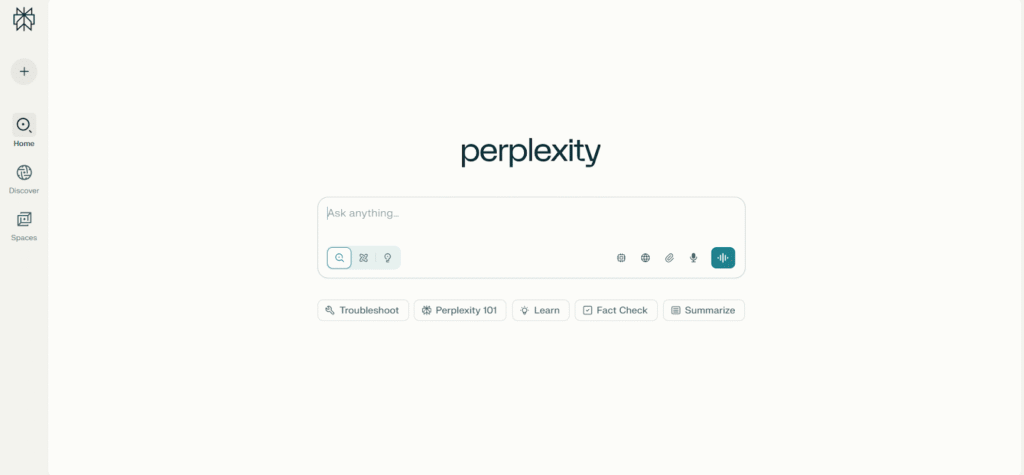
Perplexity AI is like a smarter, research-focused search engine. Instead of sifting through dense academic sources yourself, you can ask Perplexity to explain, summarize, or compare topics.
It cites its sources clearly, making it more reliable for academic or professional research than some generic AI chatbots.
Compared to Feynman AI, Perplexity doesn’t automatically turn content into flashcards or mind maps, but it excels at quick, trustworthy explanations.
Think of it as a tool for the first stage of learning: getting clarity and sources before you dive deeper.
If you often find yourself bogged down in research, Perplexity AI is a solid companion.
5. RemNote
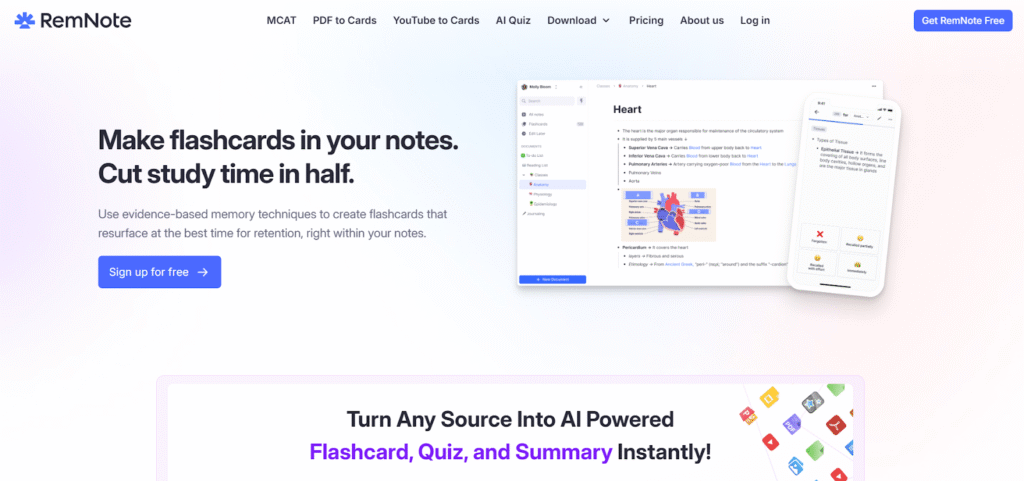
RemNote is built specifically for learning and retention. It combines note-taking, flashcards, and spaced repetition into one platform.
Unlike Feynman AI, where flashcards are generated automatically, RemNote gives you more control over what goes into each card.
Its strength is long-term learning—perfect for medical students, law students, or anyone tackling information-heavy subjects. It also supports backlinks and hierarchies, so your notes form a connected knowledge base.
If you’re serious about building mastery over months or years, RemNote is one of the best structured alternatives to Feynman AI.
6. Obsidian
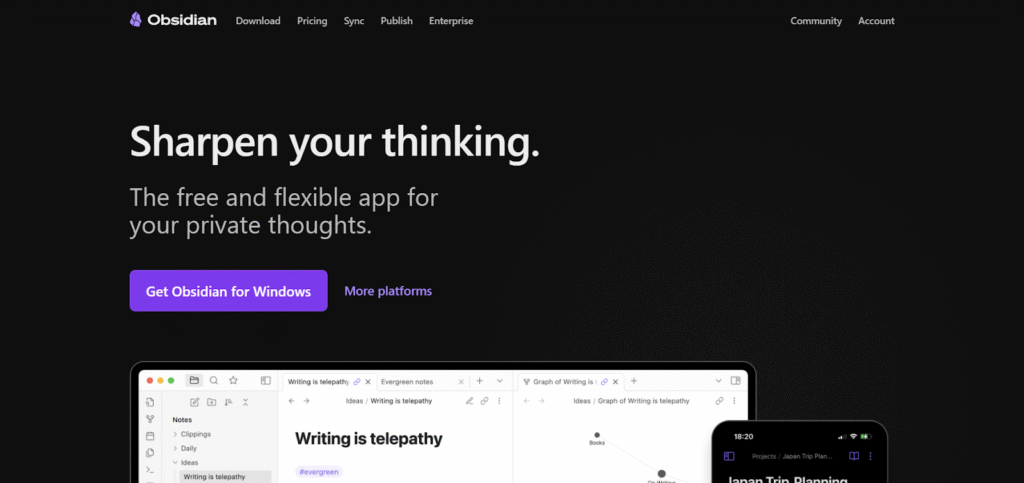
Obsidian is a favorite among knowledge workers and researchers because of its powerful markdown-based note-taking and backlinking system.
It isn’t an AI study tool in the same way as Feynman AI, but when paired with AI plugins, it can become a serious learning machine.
Obsidian’s strength lies in building a personal knowledge graph. Instead of organizing notes in folders, you create a web of connections that mirrors how ideas actually relate to one another. For learners who like mind maps in Feynman AI, Obsidian offers something similar but far more customizable.
If you enjoy long-term research projects or want to build a digital “second brain,” Obsidian is one of the most robust alternatives out there.
7. Anki
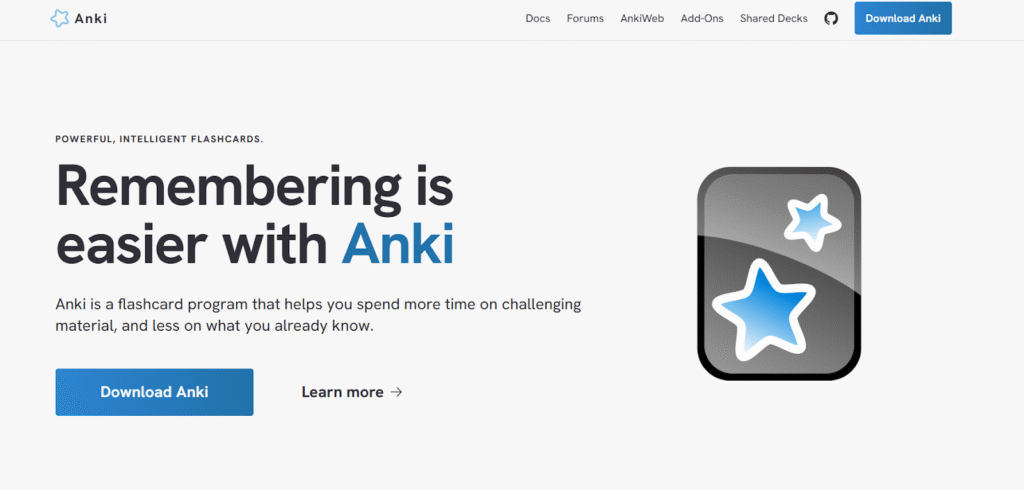
Anki is legendary in the world of flashcards and spaced repetition. It doesn’t summarize content like Feynman AI, but it’s unparalleled in helping you memorize information over the long term.
Medical students, language learners, and competitive exam takers rely on it daily.
The open-source community has built endless plugins, including some AI-based generators that can create decks from text or PDFs. While the interface feels dated compared to modern apps, its raw effectiveness makes up for it.
If memory retention is your primary goal, Anki still beats most competitors—even Feynman AI—in this category.
8. Evernote
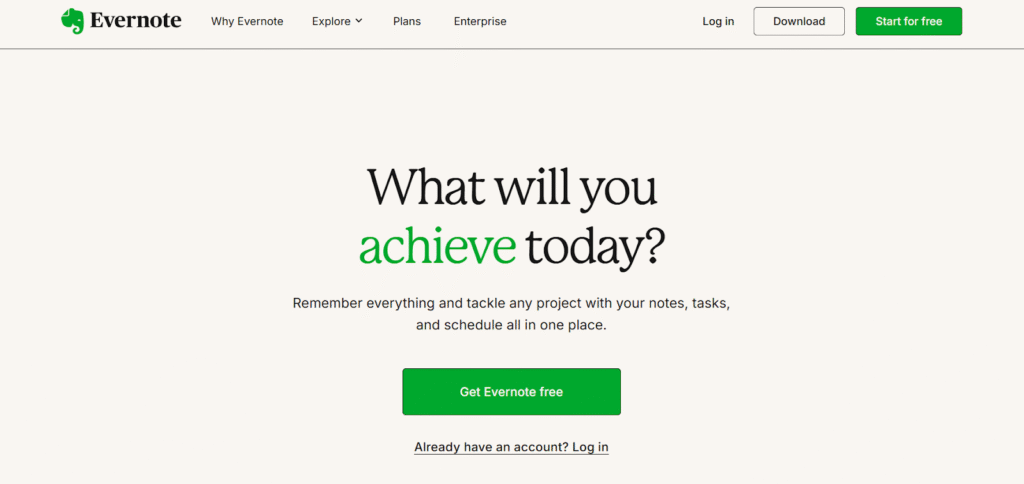
Evernote has been around for years and continues to be a top choice for general note-taking.
While it doesn’t specialize in study aids like flashcards or mind maps, its AI features now allow you to summarize notes, organize content, and highlight key points.
Compared to Feynman AI, Evernote is more about organization and accessibility than simplifying complex concepts. But for professionals who need one place to capture meeting notes, documents, and study material, it’s still a strong contender.
If your workflow is less about active recall and more about managing information efficiently, Evernote is worth considering.
9. Scholarcy
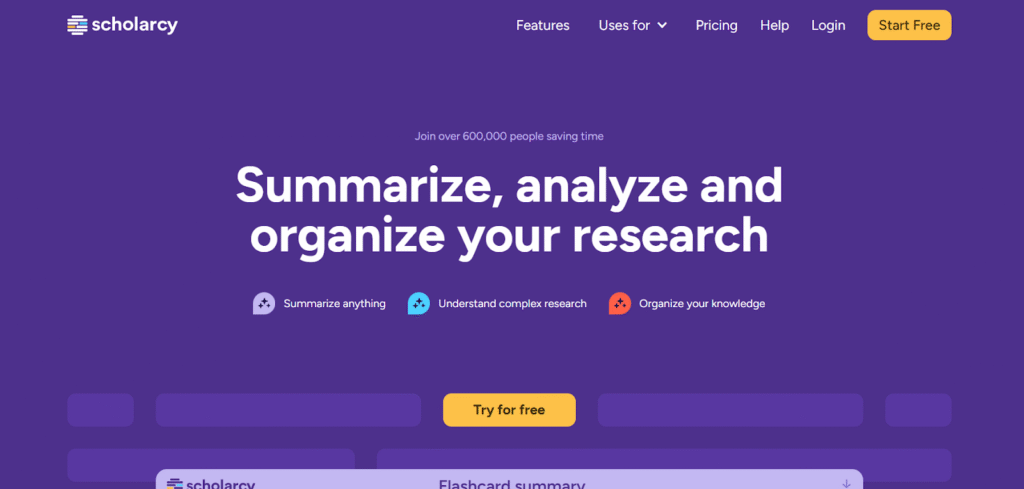
Scholarcy is a tool built for academics. Upload a research paper or journal article, and it automatically creates a summary, highlights key arguments, and pulls out references. It’s essentially a research assistant that saves hours of reading time.
Where Feynman AI excels in turning learning material into interactive tools, Scholarcy shines in literature review and academic comprehension.
It doesn’t create flashcards or quizzes, but it will give you a quick overview of any paper without drowning you in jargon.
If you’re a student or researcher who deals with heavy academic reading, Scholarcy is one of the best Feynman AI alternatives.
10. Glean
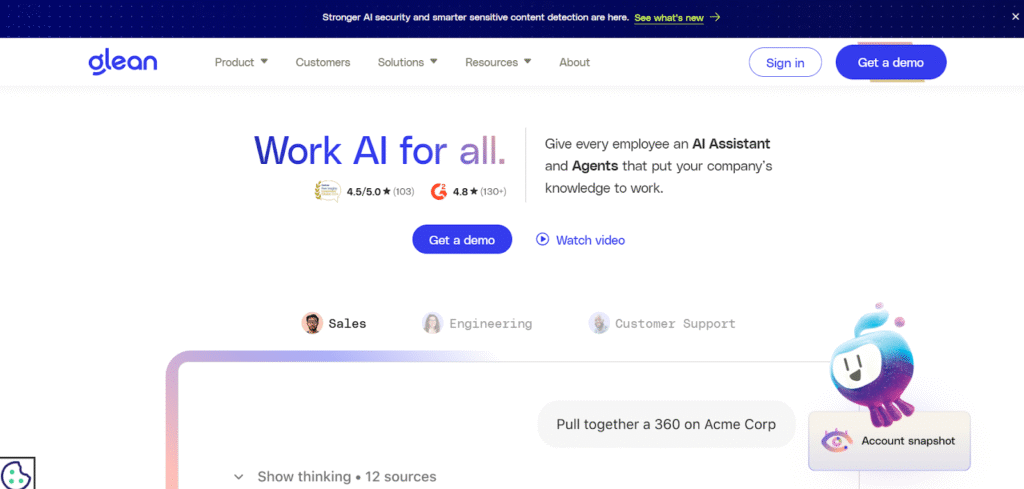
Formerly known as Sonocent, Glean is designed for recording and processing lectures. You can capture live audio, annotate it in real time, and later turn it into structured notes.
The AI helps highlight key moments and organize the content into an outline.
Compared to Feynman AI, Glean is more focused on the capture stage of learning. It ensures you don’t miss important details during class or meetings, and then gives you a clean set of notes to review afterward.
If you attend lots of lectures, workshops, or training sessions, Glean is a practical alternative that ensures nothing slips through the cracks.
Final Thoughts
Feynman AI has earned attention for making complex ideas easier to digest, but it isn’t the only tool worth considering. Depending on your learning goals, you might need something more specialized.
Some alternatives shine at memorization, others at organizing vast amounts of information, and a few are built specifically for researchers or students tackling heavy academic reading.
The most important part of choosing an alternative is matching it with how you actually learn. If you thrive on active recall, a flashcard-heavy tool like Anki or Quizlet might be your best fit.
If your priority is capturing lectures and turning them into structured notes, Glean has the edge. And if you’re more of a researcher than a traditional student, Scholarcy can save you hours.
Exploring beyond Feynman AI doesn’t mean leaving it behind; instead, it means finding tools that complement and strengthen the way you already study.
The goal is to build a personalized system that keeps you consistent, motivated, and efficient in learning.
Frequently Asked Question
Is Feynman AI enough for studying on its own?
eynman AI works well for simplifying topics and creating interactive study aids, but many learners find they need extra support from other tools for memorization, organization, or research-heavy tasks.
Which Feynman AI alternative is best for memorization?
Anki and Quizlet stand out for memory retention. Both use spaced repetition, making them especially effective for exams or subjects that require lots of recall.
What’s the best tool for organizing complex notes?
Obsidian and Notion AI are the strongest for organizing information. Obsidian excels at building a connected web of knowledge, while Notion AI gives you a flexible, all-in-one workspace.
Are these alternatives free?
Most tools offer free versions with optional paid upgrades. Anki is completely free and open-source, while others like Evernote, RemNote, or Quizlet use a freemium model.
How do I know which alternative is right for me?
Think about your study goals. If you need long-term recall, go with Anki. For quick summaries of research, Scholarcy is the best fit. For managing notes across projects, Notion AI or Evernote may work better.
Author
-
I’m an AI SaaS expert passionate about simplifying complex tech. I explore and review AI-powered products to help you make smarter decisions.
View all posts
